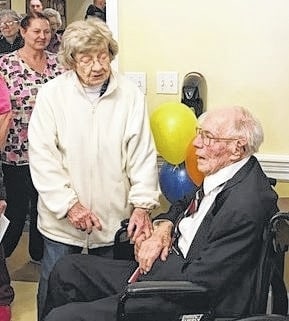
Editor’s Note: On the occasion of the 100th birthday of former News Journal editor Bob McNemar and after our feature article last week by Gary Huffenberger on Mr. McNemar, we received the below letter from Kenneth Fulton.
Congratulations on a fine piece about Bob McNemar, my first editor, my friend, mentor and model. He is to me the ideal of what a newspaperman should be.
I came to work for him at the News Journal part-time in the fall of 1955, a new graduate of Wilmington High School beginning my freshman year at Wilmington College. Early on, Bob led me across the street to the courthouse and introduced me to some of the offices I would be covering. As we were leaving, he told me to go back and get some news. I stammered: “Uh, I don’t have a pencil.”
“Well,” Bob said, “you didn’t come very well prepared, did you.” He handed me his own pencil, a fine mechanical job that I was almost afraid to touch. Since then, I’ve made it a point to know as much as I could going in for any work I am about to undertake. That’s Lesson No. 1.
The next lessons were proficiency and production. I’d almost flunked typing in high school and was glad to be rid of it — I thought. My first day at the News Journal Bob led me to a desk and pulled out a typewriter. I learned to type.
Bob himself was a wizard or a demon at the typewriter, turning out reams of finished copy with a staccato hammering that blurred almost into a single sound. I was always amazed at the output and energy.
I fell naturally into news reporting (not sure what Bob thinks), but I enjoyed it from the start. Every day in Bob’s editorial room was richer. I picked up other lessons as we went along — from Bob and his city editor, the incomparable Dottie Bicker — she was wonderful and patient with a rookie reporter.
Some of the not-so-minor things I learned from Bob were integrity in my work and accuracy. He made me aware of the faith people had in their newspaper, of how poor reporting can hurt people, and of how closely people followed the news accounts.
One thing I’ve never forgotten. Bob said, “When you’re writing something, and you come to a place where you’re not quite sure — don’t think ‘Nobody will ever know.’” And, sure enough, every time I’ve violated that precept, I’ve been called to account. Sometimes the lesson was painful — not only for me, but for a person to whom I might have done injury by faulty reporting or by a breezy attitude when writing.
It all brought down on me the importance and responsibility of the news gatherer’s job. It brought home to me that I was not writing on thin air; people would read what I wrote and because it appeared in the News Journal might act on it.
I believe that’s called the power of the press. It is considerable. And with that power goes the journalistic duty of keeping our readers, our constituents, our people, informed of the doings of their public servants, their governments, and of other happenings and events that may affect their lives.
Names, yes, Bob said, get as many names into the paper as possible. But spell them correctly, identify the people properly. When you quote someone, quote accurately. Always — always — check your facts. Never forget: what you write can have consequences.
These experiences, these truths I carried with me — put it this way, that hung over my head — during my later work at two other newspapers and then into a lengthy career in federal government service.
Bob, I remain ever grateful to you. I am especially happy to have this opportunity — via this electronic means, through the News-Journal — to let you know. I wish you the best for your birthday. I echo your credo, as related by your son: “The press is here to make our town better.”
Bob, you are still an inspiration.
Kenneth Fulton currently lives in Washington, D.C. He stayed in journalism for six years after graduating from Ohio University with a BSJ in 1959 after transferring from Wilmington College. In 1964 he became managing editor of the Federal Times, a weekly Army Times publication for federal employees. In 1967, he joined the staff of the Postmaster General Lawrence F. O’Brien, where he edited the postal service house organ and wrote speeches for postal officials. In 1973 he entered the Majority Leadership office of the U. S. House of Representatives, doing legislative analysis and writing speeches for Majority Leader, later Speaker, Tip O’Neill. In 1979, he became deputy to the Chairman of the FDIC, Irvine H. Sprague, and served with him until his retirement in 1986; Fulton assisted in the preparation of his memoir, Bailout.
In the early 1990s, he went to New York University as speechwriter for President John Brademas (former Congressman from Indiana). In 2005 he turned a hobby into a book, The Paperback Art of James Avati, which he co-authoredHe is now at work on a study of the electoral college.
He added that he is “a cousin of David Raizk and the other Raizks of Wilmington, where I grew up.”


